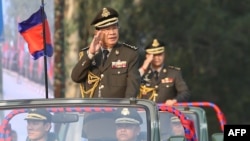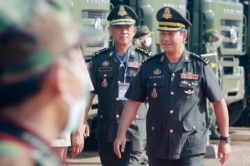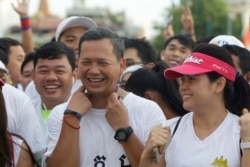Cambodian Prime Minister Hun Sen has groomed his eldest son as a potential successor ever since that son, Hun Manet, graduated from the U.S. Military Academy at West Point almost 20 years ago, and is confidently predicting his ruling Cambodian People’s Party will remain in power for another 100 years.
Analysts say, though, that that rise is far from certain and Lieutenant General Hun Manet – who also heads the army – will have to negotiate the CPP politburo, factionalism, a fickle public and China to win enough support to govern this one-party state.
Even Hun Sen, the region’s longest-serving leader, has tempered recent speculation that the top job was his son’s for the taking, saying there were many capable candidates who could contest any future leadership bid.
“It depends on people’s voices. The first concern is whether the party would accept him. The second is the general elections,” he said in a speech after the latest bout of leadership speculation.
“I will support and educate him to unleash his fullest potential.”
Hun Manet’s elevation through the military ranks was swift, and his recent appointment as chairman of the CPP’s youth wing, alongside a political mission to China, and his father’s authoritarian rule, had further fueled talk about his political ambitions.
Gavin Greenwood, an analyst with A2 Global Risk, a Hong Kong-based security consultancy, told VOA that in raising Hun Manet’s potential succession, legitimate questions about Hun Sen’s rule are also raised, ranging from the prime minister’s health to military loyalty.
“It’s always where the trouble is now, in places with a strong ruler. It’s very rare that the masses coming up from the bottom who are the threat, it’s the people around you,” he said, adding the leadership talk was one way keeping the troops in line.
“Why is he raising this whole issue now, specifically, or does he feel threatened?
“Is this essentially a warning to sections of the military that they need to remain loyal and to follow the dynasty and his son?” Greenwood asked.
“There’s more questions than answers, but with autocracy that’s usually the case,” he said.
Hun Sen returned his country to being a one-party state in 2018 elections, widely derided as a sham, when the CPP won all 125 seats in the National Assembly, the lower house of the country’s Parliament.
Victory was assured after the main political opposition party was banned, independent newspapers were closed or sold to government-friendly interests and human rights activists were jailed or fled.
Opposition leader Kem Sokha remains under house arrest on treason charges.
Carl Thayer, emeritus professor with the University of New South Wales, said that by grooming his son for leadership through political appointments but playing down his prospects in public, Hun Sen was limiting any potential rivals for the leadership.
“The minute Hun Sen says that; that’s the anointed one, then it gives the opposition, disgruntled forces the opportunity to attempt to organize and block it. So to keep everybody guessing is probably the better game that there is,” he said.
Prior to elections two years ago Hun Sen, 67, said, despite health concerns, he would lead Cambodia for another 10 years, until he is 75. He has also eschewed the West and its criticisms while forging closer ties with China, which has invested billions of dollars in Cambodia.
“China is absolutely crucial,” Greenwood said in regard to any transfer of power. “Their record is that every country that borders China, China has – as far as its concerned – has issues with.
“The last thing they want in any of these countries is something that’s going to affect stability and order and cause any sort of repercussions and resonances that’s might come back over the border at them.”
Thayer echoed those sentiments.
“Whenever there’s a leadership transition, or about to be, China makes it clear to its friends who it doesn’t like, who it sees as anti-China, and who it would object to.
“So, China’s got to be convinced that Hun Manet will carry on like his father and protect China’s interest and that the transition would not be destabilizing.”
Until then, Thayer said Hun Sen would remain the sole person to determine who replaces him, and he would be ably backed by Hun Manet and another son Hun Manith who is also in the military and heads the Defense Ministry’s Intelligence Directorate.
“Hun Sen is the center of that regime and his network protects him,” he said. “He’s got two sons in the military. They would ensure, in the meantime, that the military isn’t used or moves against Hun Sen.”








